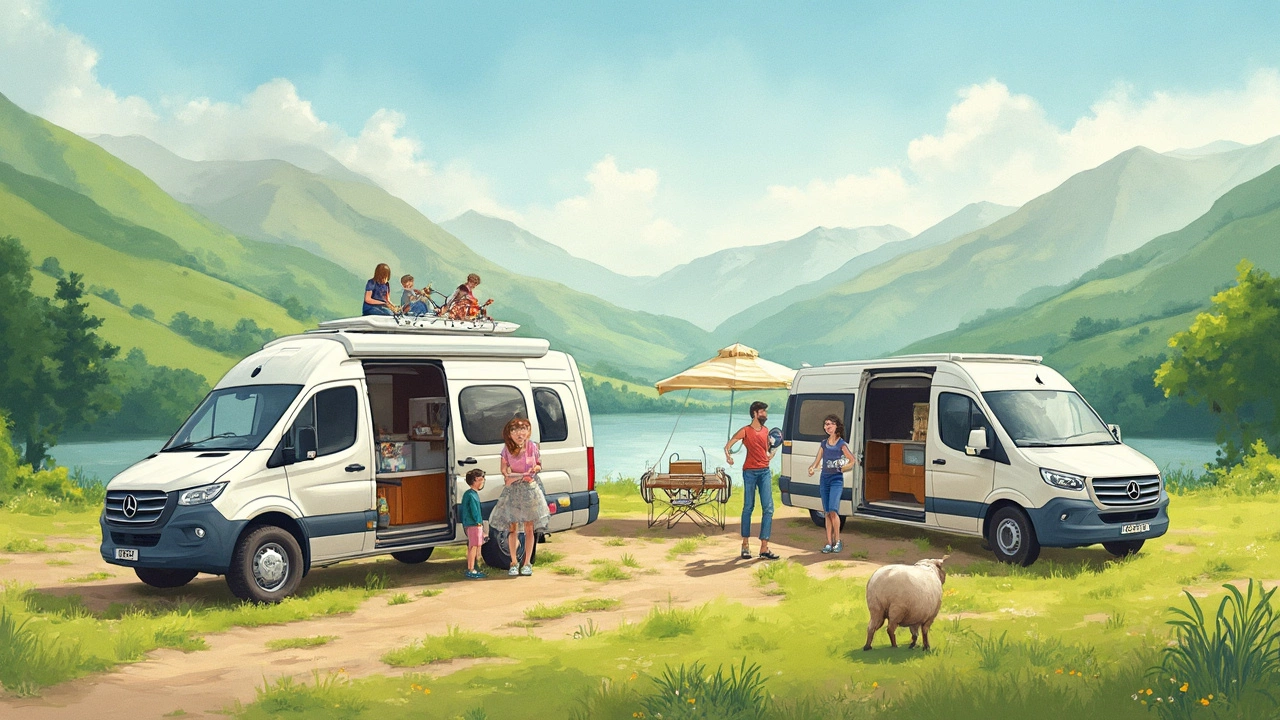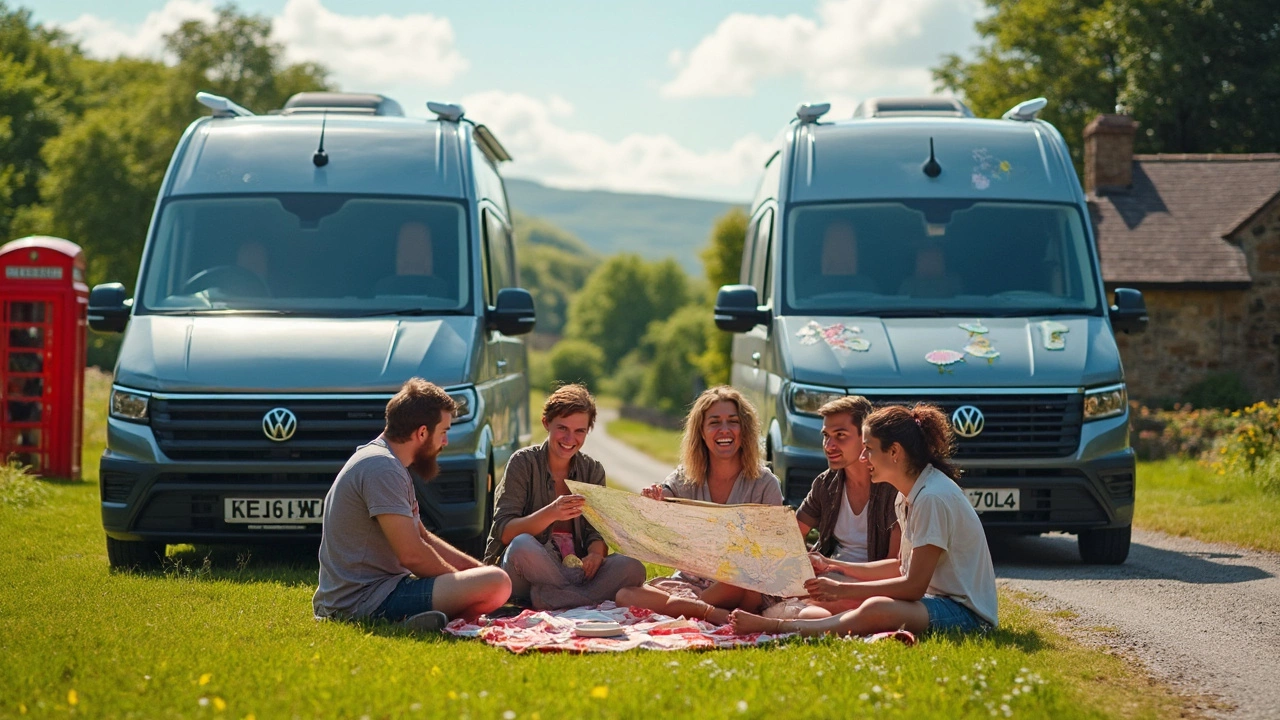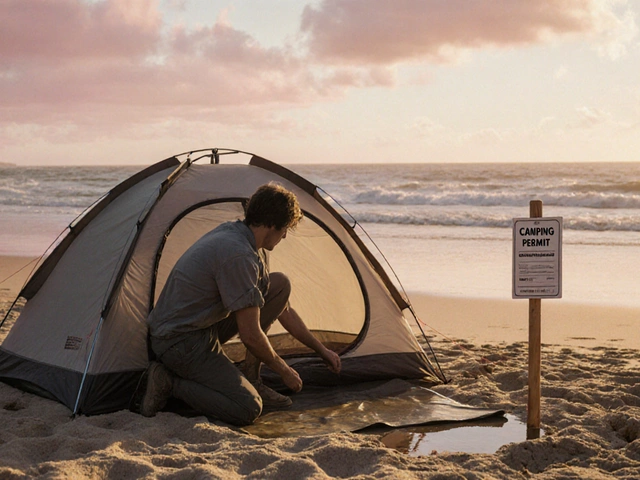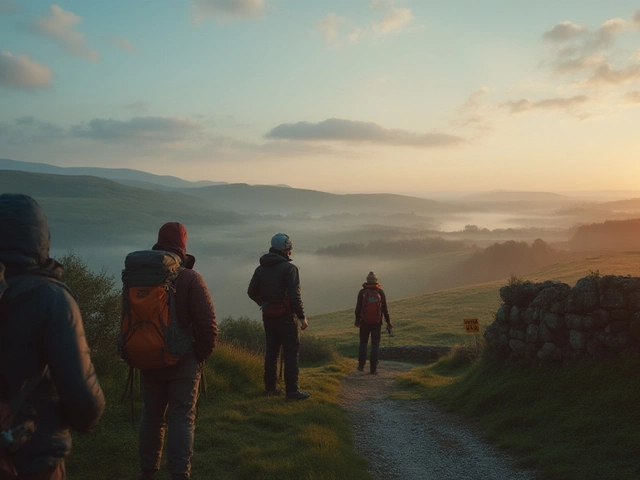Thinking of hitting the road in a campervan? You’re not alone—road trips in these rolling tiny homes have never been more popular. But you’ve got a big choice to make: do you hire a campervan just for the trip, or commit to buying one outright?
This isn’t just about dollars and cents. The right answer depends on how often you’ll use it, how keen you are on van-life chores, and whether you’re up for the headaches that sometimes come with owning a vehicle.
Want a quick answer? If you’re the type who scribbles "next adventure" on the calendar once, maybe twice a year, hiring often wins. If you dream about weekend escapes every month or plan to live on the road, buying might pay off over time—but there’s a bit more to it than the sticker price.
Let’s get into the nitty-gritty and look at the stuff they don’t put on the price tag or the glossy Instagram posts, so you can make the choice that actually works for you.
- What’s the Real Difference?
- Breaking Down the Costs
- How Often Are You Actually Traveling?
- Flexibility and Freedom: The Day-to-Day
- Hidden Hassles Nobody Talks About
- What’s Right for Your Lifestyle?
What’s the Real Difference?
On the surface, hiring and buying a campervan might look similar—you end up with keys in your hand and a set of wheels to sleep in. But the experience is totally different once you dig in. The biggest thing to get: when you hire, you pay for a set period and give the van back. When you buy, you’re all in—it’s yours 24/7, with all the ups and downs that come with ownership.
Hiring is kind of like treating yourself to all the fun, minus the commitment. You pick from newer models, snag an insurance plan, and someone else deals with cleaning and breakdown cover. Most hire companies update their fleets every couple of years, so you’re usually cruising in a modern, fuel-efficient van with working air conditioning (trust me, this matters when it’s hot and sticky outside).
Buying, though, is a long-term game. Once you hand over the cash, you’re on the hook for everything—maintenance, insurance, tax, storage, the lot. You get to customise it however you want, which is great if you have strong opinions about things like kitchenette set-ups or solar panels. But with freedom comes the reality check: repairs, annual servicing (which averages £300-£500 in the UK), and tracking down spare parts when something rattles loose halfway up a mountain.
Here’s a quick look at the practical differences:
- Campervan hire is usually hassle-free, with support numbers on speed dial if things go wrong. The van is ready to roll, usually with kitchen kit, bedding, and even campsite guides thrown in.
- Buying gives you unlimited trips and zero restrictions on where or when you take off, but all the responsibilities land squarely with you. There’s nobody to call if you break down an hour from nowhere—unless you’ve paid extra for cover.
- Rental contracts come with mileage limits, cleaning fees, and strict return times. Owning is more relaxed—but only if you don’t mind sorting all the admin.
If all you want is a few weeks of road trip magic, hiring often means less stress and a lot less paperwork. For hardcore travelers, ownership gives you ultimate flexibility, but every mile comes with a little more effort behind the scenes.
Breaking Down the Costs
Let’s get real: the price tag is the first thing most folks look at, and for good reason. Hiring a campervan is straightforward. You pay for the days you want it, gas, and maybe some extras like bedding or insurance. In the UK or Australia, hiring a basic van for a week will usually run from £400 to £800, depending on season and size. Add peak summer rates, and you could be nudging £1,000 per week, especially for big family models.
Buying a campervan is a much bigger upfront decision. A solid used van starts around £15,000–£25,000, though custom-built or fancy new models easily break £60,000. New vans drop in resale value fast too—expect a hit of about 20% in the first year. That’s before counting insurance (typically £300–£500 yearly), maintenance, MOT, parking fees if you don’t have a driveway, and road tax (in the UK, usually £200–£400 a year based on emissions).
You also need to think about running costs, not just the initial spend. Here’s how the numbers usually pan out:
- Campervan hire: Pay only when you use it. No insurance, no long-term commitment, no surprise repair bills. You walk away clean once the trip ends.
- Buying: Regular servicing, tyres, breakdowns, winterizing the van if you store it, and small things like batteries or leaky roof seals. These costs run at least £500–£1,500 a year, more if you have an older van or rack up serious miles.
Most people book two or three adventures a year. For them, hire costs stay far lower than what you’d shell out to buy, unless you really become a full-time vanlifer. Also, factor fuel—bigger models love to gulp diesel, and you’ll burn through £100–£200 just on a long weekend road trip.
One last thing: the longer you wait to sell a van you bought, the more you lose to depreciation. With hiring, you can try different vans each time, which saves regrets if your needs change—or if you find van-life isn’t so dreamy after all.
How Often Are You Actually Traveling?
This is the part most people overlook until their wallet starts feeling lighter than they’d like. How much time will you actually spend on the road? Your answer can tip the scales hard towards hiring or buying.
Let’s break it down with some cold, hard numbers. Research by the UK-based Camping and Caravanning Club found that most owners use their campervan only five or six times per year, sometimes just for long weekends. That’s maybe 20-25 days out of 365. Now ask yourself — are you about to be the exception, or does that sound about right?
| Trips Per Year | Average Days Used | Typical Owner Experience |
|---|---|---|
| 1-2 | 5-10 | One big trip or a couple small ones |
| 3-5 | 10-25 | Seasonal road tripping, mostly weekends |
| 6+ | 30+ | Frequent adventurers or part-timers |
If you’re planning one summer adventure, maybe a festival, and a random autumn getaway, campervan hire is almost always cheaper and less hassle. You won’t be paying for storage, insurance, or worrying about breakdowns while it sits in your driveway the other 340 days a year.
On the flip side, if road trips are your family’s thing—maybe you work remotely and chase new views every month—the costs of repeated rentals add up fast. That’s when buying starts to look like a smarter play, not just for your budget but also for convenience and peace of mind.
- Be honest about your schedule. Keep a list or use a travel calendar to track potential trips for the year.
- Remember, life gets busy. In surveys, over 70% of new campervan owners admit they use it less than they expected in the first year.
- Hiring lets you try different van models for different trip types. Want a compact one for solo travel and a larger one for family getaways? Renting makes that easy.

Flexibility and Freedom: The Day-to-Day
How much flexibility do you really want on your travels? With campervan hire, you get a lot of control over your adventure—just book it, pick it up, and you’re off. Swapping styles is easy too: try a small model for a solo trip or go bigger for family outings. You always get a recent model with fresh features, and if something breaks down, you’re not stuck—most companies offer quick roadside help or swaps. No need to stress over surprise repairs or flat tires eating up your holiday.
But when you own a campervan, you can hit the road whenever you feel like it. Weekend last-minute trips? No planning hurdles. You set the pace and skip searching for available rentals in busy travel months. Plus, you can store your own gear right inside, so you’re always packed and ready. But, with great freedom comes a few chores—keeping up on maintenance, making sure the van’s insured, and the classic worry about where to park it when you’re not using it.
| Feature | Campervan Hire | Buying a Campervan |
|---|---|---|
| Trip Flexibility | Depends on rental slot availability | Anytime—just grab the keys |
| Breakdown Support | Usually included 24/7 | Only if you add roadside cover |
| Model Options | Choice each time you rent | Stuck with your van unless you upgrade |
| Upfront Paperwork | Quick and simple when renting | Full ownership process—insurance, V5, MOT |
| Storage Requirements | None | Need parking space year-round |
The numbers don’t lie: according to UK travel data, over 60% of hired campervans are used for trips under 10 days, while most owner vans spend more than 250 days a year off the road. That’s a lot of parked-up investment if you’re not traveling often, but total freedom if you want a van ready at a moment’s notice.
Tip: For spontaneous trips during peak seasons, rental companies—especially the popular ones—can get booked out weeks ahead. If you value drop-everything weekends, owning a van plays in your favor. If you don’t mind planning ahead, the flexibility with campervan hire keeps things hassle-free.
Hidden Hassles Nobody Talks About
Let’s be real—there’s more to campervan travel than epic views and Instagram stories. Both hiring and buying come with annoyances that folks usually don’t mention until you’re in the thick of it. So let’s call out the big ones to help you steer clear of nasty surprises.
If you’re thinking about buying, brace yourself for ongoing upkeep. Routine maintenance is a must, even if you only use the van a couple of times a year. Tire rot, leaky seals, battery issues—these things creep up when a vehicle sits unused. According to the AA, more than 30% of breakdown callouts for campervans in the UK last year were for electrical faults or battery failure. Repairs can quickly eat away your road-trip budget.
| Common Campervan Hassle | Average Cost (UK, 2024) |
|---|---|
| MOT + Service | £250 |
| Annual Insurance | £350 |
| Battery Replacement | £180 |
| Storage (if no driveway) | £300 - £800 |
Then there’s the paperwork. Think insurance, road tax, and if you live in a city, sometimes even permits. If you only travel a few times a year, this admin load gets old fast. And storage—got a driveway big enough? If not, you’re shelling out for a spot to keep your van safe from vandals and weather.
Renting doesn’t get you off the hook either. With campervan hire, you’ll have to double-check contracts for hidden fees. Mileage limits? Extra driver charges? Cleaning fees if you bring the van back with muddy boots? Yup, those all pop up. Some companies even block thousands in deposits from your card just in case you scratch the paintwork.
- Try to photograph the van at pickup and drop-off.
- Look closely for any existing dings or damage before signing.
- Ask about mileage caps and charges for late return—many renters pay £50/hour overrun!
"Nobody likes finding out their £1200 security deposit is held up for a fortnight because of a tiny windscreen chip. Always ask—some companies are way more relaxed than others." — Honest John, auto journalist
Here’s another thing—cleaning toilets. If you’re buying, emptying the waste cassette is your job. Trust me, nobody loves discovering a full tank after two weeks parked in a warm garage. Hired vans usually require you to return everything spotless or pay an extra fee, so bring gloves either way.
And watch for seasonal spikes. Want to campervan hire in July or August? Demand soars, and prices can double. Popular models might be booked out months in advance, leaving you scrambling for whatever’s left (sometimes a battered old van held together with duct tape and good wishes).
If you’re up for the reality checks—maintenance on your own van, reading all the rental fine print, and bracing for price jumps—you’ll have a much smoother ride. No need for sugar-coating; it’s all about being prepared and knowing what you’re signing up for.
What’s Right for Your Lifestyle?
Not everyone has the same travel bug. Some folks crave a spontaneous weekend escape, while others only manage a big getaway once or twice a year. Let’s break down how your own habits and lifestyle play straight into this choice.
If you travel a handful of times a year, campervan hire is often the clear winner. Why? You skip the headaches of insurance, yearly maintenance, and finding a parking spot that isn’t stressful or outrageously expensive. On the flip side, if you’re planning to work remotely on wheels, or want to hit the road every couple of weeks, those rental fees add up shockingly fast.
Some people love tinkering with gear and don’t mind fixing little things here and there. That’s great if you buy, since most used campervans need regular attention. If you’d rather spend your Sunday exploring than hunting down a water leak, renting means someone else handles that drama.
Here’s a quick comparison that shows what kind of commitment you’re really buying into:
| Lifestyle | Best Option | Key Reason |
|---|---|---|
| Occasional Travel (1-3 trips/year) | Hire | Cheaper overall, zero upkeep |
| Regular Adventures (6+ trips/year) | Buy | Saves long-term, more flexible |
| City Life (limited parking) | Hire | Avoids storage stress |
| Love Customizing | Buy | Personalize everything |
| Zero DIY interest | Hire | Skip repairs |
The trick is balancing what you actually want from travel with what you want to spend—both money and time. Do you love changing up your setup and planning tricked-out built-ins? Ownership lets you do that. Hate surprise bills and paperwork? Hiring takes all that off your plate.
One surprise people mention: keeping a campervan in good shape isn’t always cheap. Homeowners might have a garage, but if you’re renting a flat with tight parking, sometimes just finding a spot costs £100/month or more in big cities. And insurance rates can change a lot based on where you live and your driving record, making it smart to check real local numbers before you decide.
Dive into your own habits, budget, and risk tolerance before making the leap. The right pick isn’t what’s trendy online—it’s what fits your actual life without regrets.






